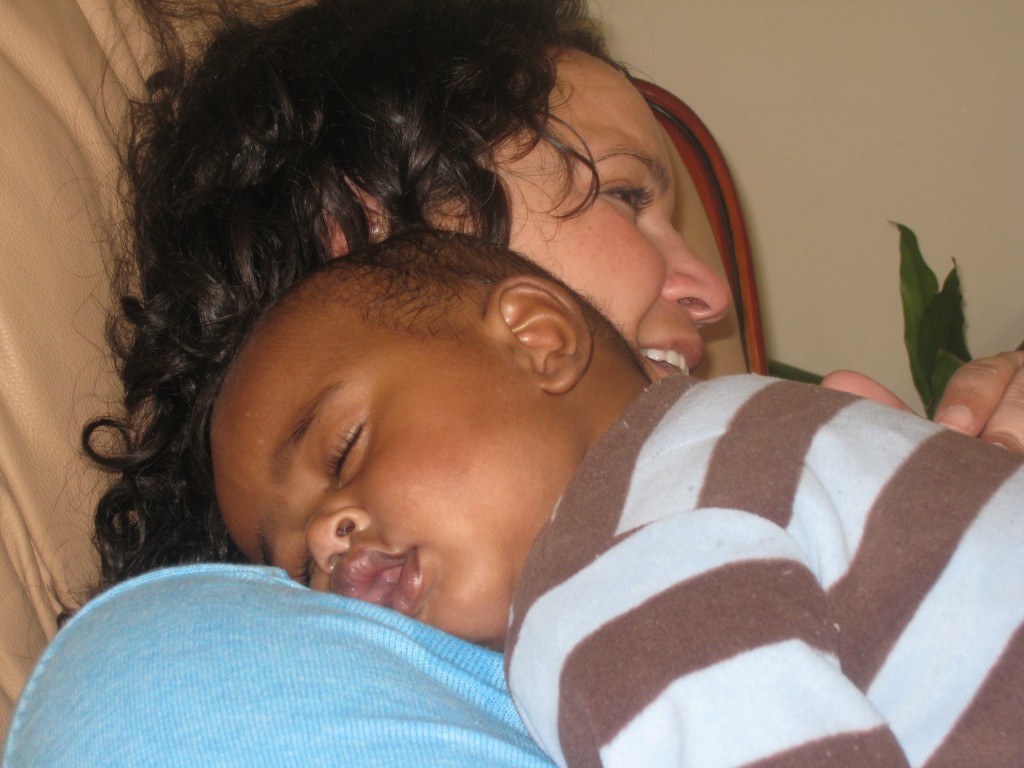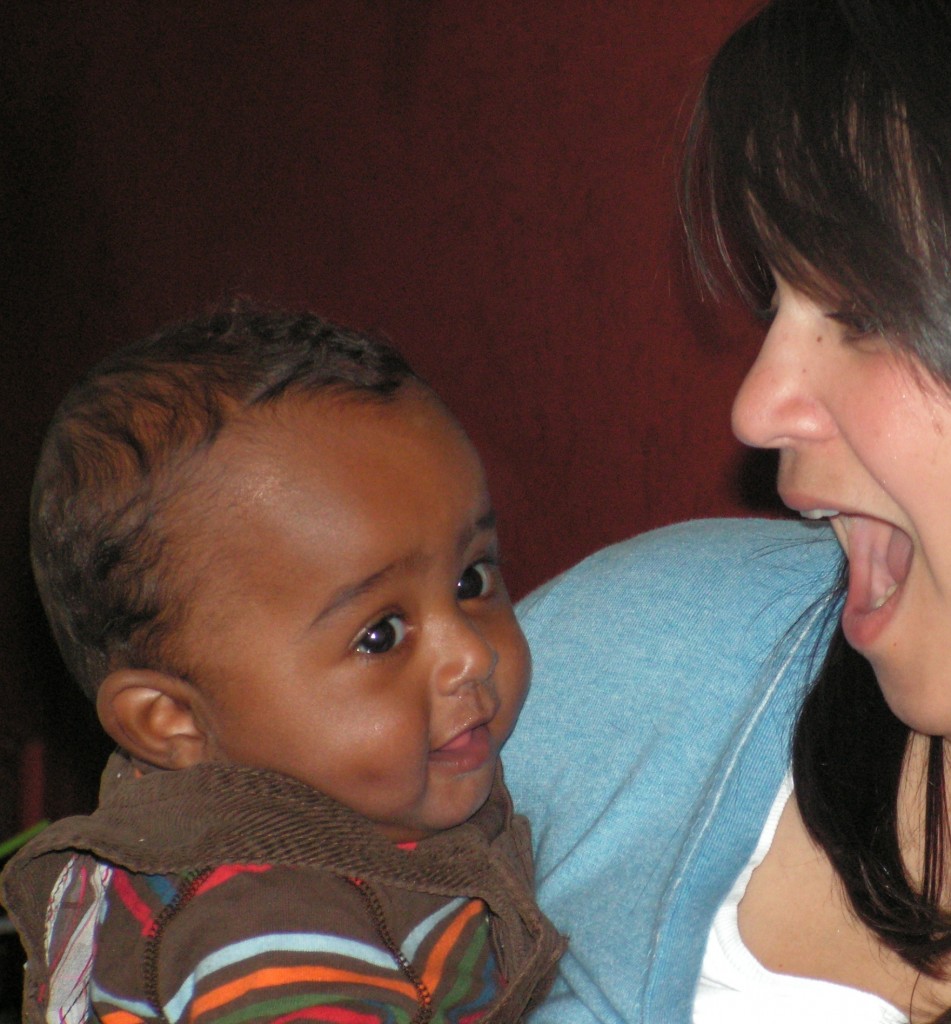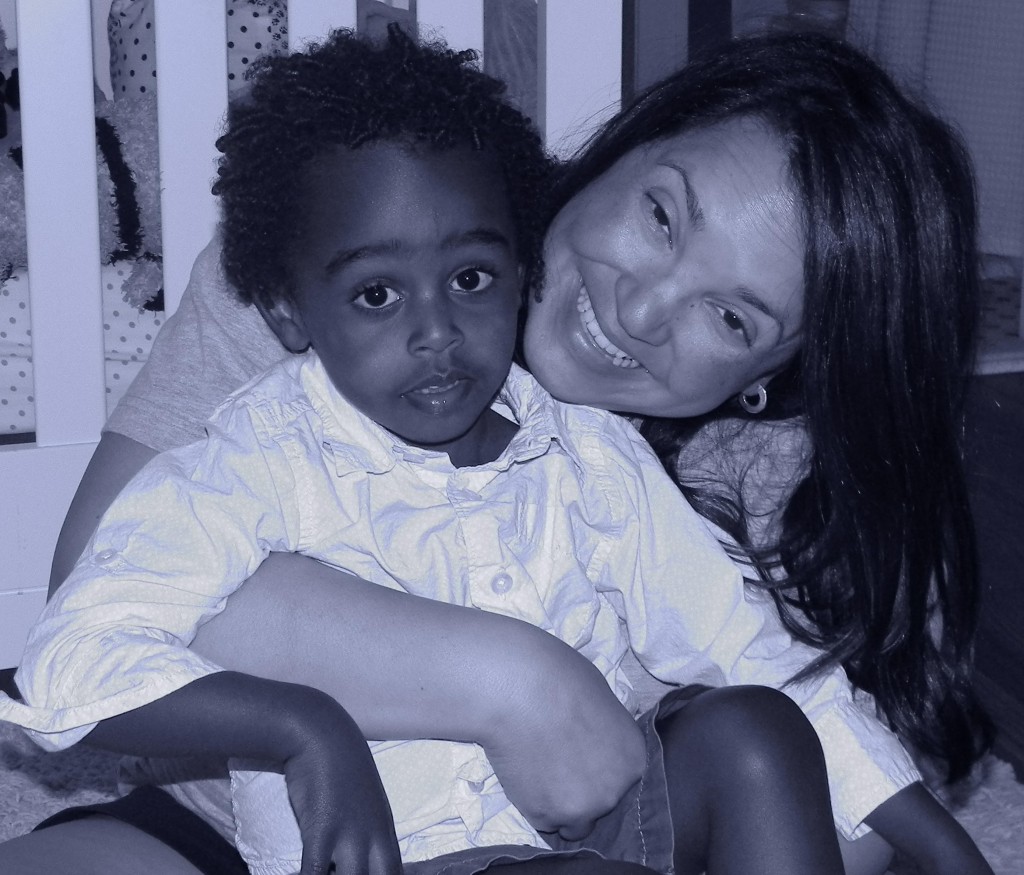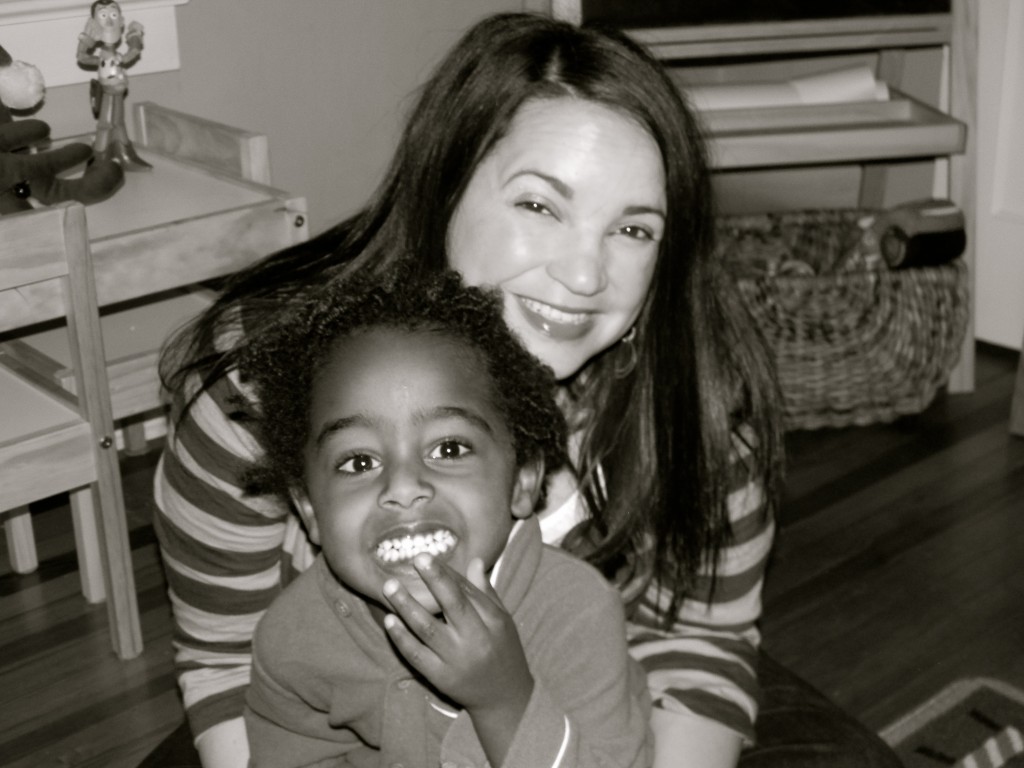For a long time, my ethnicity mattered a whole lot to other people. I wasn’t yet fully formed. I didn’t yet have work that I did, causes that I supported, a fundamental way that I moved through the world that others could reliably see and use to define me and so how I looked, where I lived, what my background was suited some people for my definition. My ethnicity was used to define what I was capable of and what I might do on that day and in the future.
My ninth grade guidance counselor, who I met for the first time at the end of that school year, peered over my transcript, the one with my perfect grades in honors classes and the one that clearly read that I was Puerto Rican, and suggested I might be better suited for and better served by vocational classes. There is nothing wrong with vocational classes- in fact, one of the most important classes I ever took was typing at the vocational program’s night school while my mom took sewing classes- but I knew in ninth grade that a transcript full of vocational classes wouldn’t get me into the school I was most interested in then- the University of Virginia.
Maybe I should be a little bit more practical, my counselor told me.
I stumbled out of his office, red face relaying my shock. Another counselor saw me, had known my older brother and sister years before, and called me into his office.
“What’s wrong?” He asked. I was a good girl, inclined to think adults were always right. I only told him a little bit of what had just been said, but it was enough to probably change the course of my life. He added me to his caseload for the rest of my high school career. That restored some of my faith in adults, in myself, but not all of it. I never applied to UVA, and I know that my definition of what was possible for myself changed some that day.
Years later, not long after my college career ended, I ran into an admissions counselor from the place where I did go to school.
“You were a Spanish major, right?” She asked. She said this is a snide, assuming way- as if the one way I could be successful at the school I attended was if I had majored in something I’d had my whole life to learn.
The friend I was with, one of my closest friends at the time, coughed in discomfort as she asked this. I remember thinking at the time, that’s a warning. But to which one of us? Her for asking this patronizing question or me to indicate it just wasn’t worth it; don’t engage crazy, he might have been telling me.
For a moment, I was silent, collecting words and peace in my heart. And then I explained that, no, I had designed my own major in a special program that our college had for students who wanted an interdisciplinary major in lieu of the traditional liberal arts curriculum offered. It was a program that was considered difficult, that demanded a massive thesis rooted in deep research as the final product.
Her mouth rounded into a big O of surprise.
As if to justify her earlier question, she said, “We let you in not because we thought you’d be an academic powerhouse, but because of what we thought you might add to the campus.” And she winked in a knowing way.
My friend and I begged off then. Because, really, what can you say when someone’s mind is already made up about you?
And though I had taken great pride in my area of study, I also knew how hard it had been to get into the program because of how I was perceived and what I was studying.
“Can she really write?”
A professor connected to the program (who had never had me in class and to whom I don’t believe I had ever spoken) insisted on discussing this question at length with my advisors. It was a question they had never been asked with such fervor about their other students who had previously applied for the program, they admitted to me. They were stunned by the question, I think, because it had never been pressed in such a way, and the irony that I was, indeed, a good writer (if I am honest, there is some poetic justice looking back at this story, now). I went to an academically rigorous school. It was assumed we could all write, until it wasn’t assumed maybe that wasn’t true for me— maybe something else got me in— by someone who didn’t know me or my work at all.
Even then, I wondered if the question was being asked with such fervor because I was fundamentally different from 99% of people on campus. If anything, that admissions counselor’s comment had reminded me of the uncomfortable possibility that I was perceived as valuable because I was just smart enough for a tan girl to be added into the mix.
But there was another reason that question could have been asked, and it was because of what I had asked to major in and research. Eventually, I was admitted into the program where I majored in African-American Studies and Urban Education issues and specifically researched youth gangs. My area of focus was what roles schools could play in reducing youth violence. Specifically, if you asked me, I would have told you that the gangs of the late 80s and early 90s—not the big criminal gangs with massive drug trades but the sets that sprouted up all over depressed cities in America— were like the urban Boy Scouts.
At 15, we all want to feel a part of something. Got nothing to be a part of in your area of town, got no one who can take you to something ‘productive’ after school, you are still going to try and find a group. Then you and your friends are going to move in en masse and find something to do. Wanting to be a part of the group is the fundamental nature of the teenager, finding something to do together is the nature of a group. Sometimes the things that group finds to do are considered productive, sometimes they are not. These young men weren’t inherently criminal. What they did didn’t have to turn menacing, and I theorized that our schools could partner with families to insure that it didn’t—by being deliberate about what was done during the school day and what was offered after the school day when parents were still working.
I bring this all up now because I know what it is like to be profiled as a teenager and young adult. I know what it is like for adults to base their assumptions about you on what your race or ethnicity is, because they feel your life hasn’t yet been more fully defined or, more accurately, the way you have defined your life hasn’t yet been given more credence. Too many people will go for the easy definition of you when you are sixteen. They will put you in a box of their own understanding. And that box of understanding is often labeled by the skin in which you are wrapped.
And I can whine all I want about how it was hard for me that I was defined by my tan skin as a teen. But, let’s be honest, my skin or gender did not identify me as someone who might be threatening, menacing. It only defined me as someone who might be dumb or lazy (or, in cases that I didn’t get into here, sexual).
I think about this all now as the mother of an African boy— a black boy. A black boy who, let’s be honest, has already had a pretty rough life. And, now, he has to move through the world with people either being suspect of him because of his darkness or willing to give him a pass because his mama is light enough- and has proven herself enough- to not worry about anymore and his daddy is white.
For weeks, now, I have been heartbroken over Trayvon Martin. I almost couldn’t find words for it—I’ve been so devastated for Trayvon’s family and terrified for my own son. When your child comes into your life, what you realize is the fullest extent of love. You’ve heard me talk about it here before, how suddenly you realize how much you have to lose, how you haven’t even touched the knife blade of love and fear until you parent.
I remember when I first dropped my boy off at preschool and how, as I watched him walk away from me, I suddenly had this awareness that this was just the beginning of him moving through the world out of my arms and in his own context. I know that people will look at him and place him in a box of their understanding, and, sometimes, that box is going to be based on his skin color. I know this because I have been there myself. I know this because my area of expertise for a long time, academically, was black boys and now it is my personal area of expertise.
The other day, I was at the indoor play place at the mall with my boy. As he ran around, jumping off, crawling over, sliding down the stylized Looney Tunes characters, I saw my boy as if removed from myself. Expressive, energetic, fearless. He walked up to other parents sitting around the edge and engaged them in conversation. Will someone, someday, find that threatening? I don’t know, but I do know that I don’t get to assume that they will not. If I want to literally keep my son alive, I have to have hard conversations with him as he grows up. I have to not turn a blind eye. I have to parent like nobody’s business. And then I have to pray. That’s the nature of parenting, isn’t it? That feels true for every single parent- no matter the color of her child’s skin. And yet.
I woke at 3 am on Sunday morning because my boy did. And as soon as he went back to sleep, the first sentence of this post came into my mind, and I knew that I had finally found just some of the words I needed to pour out of me, and so I moved to my computer and let these words out in the dark of night, no lights on except for my computer screen. It is not the first time I have been kept awake, worried for my boy, and it won’t be the last. I can only pray that this national conversation begins to create a world where our sons—all of our sons—are no longer seen as people to fear but, instead, as people worth getting to know.







What a thoughtful and heart wrenching commentary Rosie…the other day I heard a bit on NPR and I thought you might like to read it: A Mom’s Advice To Her Young, Black Sons
http://www.npr.org/2012/03/22/149126015/a-moms-advice-to-her-young-black-sons
Thank you so much for sharing this, Karen. I would have missed it, and I am so glad I didn’t!
I have goosebumps all over my body Rosie. Thank you so much for sharing this with us. It is an extremely important narrative and I feel privileged to have read it.
Thank you, sweet friend.
Rosie,
This is so beautiful & so true!!
Thank you!
Thank you, honey. Abrazos.
I’ve had this case on my mind, too. I’m not a mom of a black boy (my boy is white) but he is on the autism spectrum and that also sometimes reads as “threatening” (somehow, to some people) after adolescence.
It isn’t the same, but the fear is similar.
But if there’s one thing I am doing my damn best to do, it’s to keep him from being someone who would jump to a bigoted conclusion (whether that has lethal consequences or just soul-crushing consequences). Which, really, is just doing my best to maintain his innate sense that we’re all just people and we’re all ok. We choose to live in an area where he’ll be able to have diverse friends – and he does.
We are parenting towards Dr King’s dream. Not al parents are with us, but our numbers are growing, I hope and pray. It’s getting better.
Meanwhile, my heart is with Trayvon’s family and with all who mourn.
You are so right, Alexis, about that fear for our boys being so similar. Love your consciousness and deliberateness as a parent. Yes, indeed, parenting towards the dream is the only way to live in hope.
Wow. Girl we need to talk. I am sitting here with tears in my eyes. As a white mom of three black boys, I have spent many hours contemplating these issues. I have had it in my heart that I want to talk about and write about these issues. You have made a beautiful entry into this dialogue…the struggle continues. You have inspired me on this sunday morning and I thank you. BTW your boy is adorable!
Oh, Teresa, how have we not talked more about parenting? Yes, indeed, we need to talk! Thanks for your kind words and empathy.
Thank you for sharing such a powerful and open-hearted piece, Rosie.
Oh, thank you so much, Anna. That means so much coming from you!
Rosie, I think you and I were having the same night. Here is what I wrote last night http://roundwomanfrancesca.blogspot.com/. Wishing no mother should ever have this fear.
Love & Peace, Francesca
Loved your post, Francesca. So powerful. And I am so grateful to have you to call on as we travel through motherhood together!
I think you’ve solidified the fact that I will stay in continuous communication regarding any/all ‘advice’ handed down from ‘guidance’ counselors in the future. I too was advised to do something other than what I’d always dreamed and now see my skill and instinctual preference for. I’m was a young girl told- “that will take lots of math and science. do you really think that is your strength? girls don’t really get into that stuff.” DASHED. I still remember it vividly to this day- a previous straight A student I next failed 3 classes as my entire sense of self was lost. I do NOT want to leave my child susceptible to this prodding. I want him to have confidence in his sense of self. Bold in who he is as a child of god. How- oh how do we do this and keep them alive?
You end with such a powerful question, shannoncl. It is so important for us to be the loudest, brightest voice in our children’s ears– or they’ll listen to that one dissenting, discouraging voice and I’ll be darned if someone else who flits in for a moment gets to have that lasting impression on my child. Here’s to being the loudest, most positive, most assuring voice!
This post literally gave me chills, and I’ve shared it with many people I know already. We actually just started taking a course on multicultural families in beginning the process of transracial adoption, and so this resonates profoundly with me. You are a brave woman, as is your son. Thanks, as always, for starting important conversations and adding a much-needed voice.
Thank you, Ashley. I am so excited about your adoption journey and am happy to help any way I can. You are going to be an amazing mama, friend.
Rosie, I feel your being a kindhearted woman and i’m so proud of you. Thank you for doing this for the boy. He really needs you on his side.
Kudos to you!
Thanks!
Amen sister! I knew that when you found your words it would be profound.
Your post really propelled my voice, Heather. Thank you for your thoughtfulness and for being the type of mom I am honored to walk beside and compelled to look towards for guidance.
What a beautiful, poignant piece. While I want to drop-kick your guidance counselor, there is no getting around the prejudices that exist. We need to call it out when we see it and demand better for our children. I am glad I found your site through Michelle in the Middle. Erin
So well said, Erin. Being aware allows us to be the best possible advocates along the way. Happy to have connected with you, too!
You are a beautiful writer. I always thought of you as a kind person and a leader. Thank you for sharing.
That is a lovely thing to say, Catherine. Thank you!
Rosie,
Loved reading your piece. Your boy is adorable! Beautiful and thought-provoking writing. I hate to think that a guidance counselor at Spring Valley misjudged you so horribly. Hope that you are well.
Oh, thank you so much, Shannon. I so appreciate your kind words. All is well– I hope for you, too!
this post is stunningly brilliant. i wish i was in charge of the world, i’d make everyone read it.
little known fact: i minored in african american studies.
Thank you so much, Tami. And why am I so not surprised by that little known fact? Can’t wait to meet you in the flesh one day!
Sad and beautiful story, Rosie. As “just a girl,” I too was discouraged in h.s. from doing anything significant with my life; reinforced by my then-church, whose opinion was that women were to shut up and make babies. Sad to see their ilk are still out there, louder than ever.
Although I don’t have a dark-skinned son as you do, my heart also breaks over Trayvon Martin and the whole insidiousness of racial profiling. Thank you for writing such a thoughtful and poignant post.
I am grateful that you find the words to express for those of us who struggle. You and your precious family are loved & I feel blessed that as I parent I can look towards you for inspiration.
I was very touched by your post here. I know this little boy here, is so thankful to find a mother in you. You are such an inspiration not just for women but for all.
Thank you for sharing this wonderful story.
Wow. Excellent post and what a cute little boy! 🙂
Rosie, Bill and I have been terribly upset over the tragic murder of Trayvon. I couldn’t quite express why this event had us so in it’s grip. And, of course, in addition to this senseless, loss of an innocent young man, it is Abe that makes this entirely personal and deeply frightening. Thank you for writing about it and giving voice to all of us who love him and long for a kinder world. Thank you for bringing him into our lives. And thank you for being the wonderful mother you are to our sweet Abe. Love, AB
I’ve been thinking about this post since March 25. I read it then, but something interrupted me as I formulated my response. (I guess I’m pretty busy since it’s taken me this long to return to that interrupted task!) First, your boy is going to be really smart about navigating this racist world because of all you have to teach him about power and justice. Second, that admissions counselor has, I hope, been fired. Such ignorance goes even beyond microaggression.
wow! You really hit the needle on the head with this one. You really highlighted on how important it is for parents, especially parents of children of color ,to raise a well prepared child. My parents did the best they could but looking back they raised me to not know how to react, how to hold my head up high when I was being characterized and judged for the color of my skin. In this world it is so easy to be swallowed by prejudgments and categorizations mixed all up with low expectations measured against white superiority but one thing that cannot be changed or meddled with is an individual that stands strong in their principles and the uniqueness of their identity. This is what I hope to teach my children. We can not change the historical hierarchy but let us change our generation to know what they will confront and prepare them with the tools to properly approach it.
I was so upset about Trayvon Martin. As a mother of two black boys, I felt a sense of hopelessness. Just to think how this young boys life, his future, was taken from him because of prejudgements. I immediately had a strong talk with my 12 yr old. My heart aches for his family. On another note it is very important to recognize all of the people who have come out to speak out against this.
You are a beautiful mother.
Your writings always move me.
-Gladira
So well express, Gladira. And you are a pretty beautiful mom yourself. You are so loved!
Touching post. Thank you for sharing. I am Black and Japanese and have 3 beautiful black sons and I fear for them as well. It’s not a fear that is pervasive but something subconscious that drifts out from time to time like. Hopefully, the Martin’s Tragedy will result in people being more open with each other and diminish attitudes about race.
Your son is very lucky to have such a wise Mom and he’s beautiful to boot.
This is exactly my hope, too, Suz. Thanks for sharing your thoughts and for your kind words!
Here via Twitter. I have been interested in international adoption for a long time, but coming from a place of white privilege I have never thought about the difficult conversations I might have to have with a child who does not look like me or my husband. Thank you for sharing your personal story – having attended college in the early 2000’s your experience sounds like something out of the 1960’s to me – it’s hard for me to believe that people would make such assumptions about you based on race; yet I’m sure that it’s still happening today to minority students all over the United States.
Hi Heather! Thanks so much for your comment. International adoption has been an incredible gift in our lives– especially because it has made us be so deliberate about culture, race, privilege, etc. What all kids need are earnest effort and the fearlessness to both see what’s real, defy it and change it. And you are absolutely right- there are still so many assumption about race in our country (I graduated from college in ’96). But intentional people can change that. Thank you for your earnest, intentional nature! I wish you all the very best on your journey!